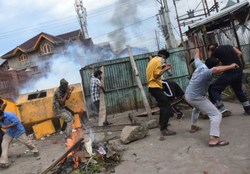 Authorities in Indian-administered Kashmir have detained about 4,000 people since New Delhi scrapped the Muslim-majority Himalayan region’s special autonomous status.
Authorities in Indian-administered Kashmir have detained about 4,000 people since New Delhi scrapped the Muslim-majority Himalayan region’s special autonomous status. RNA - Media reports citing a recent government data reported on Thursday that Indian forces had arrested more than 3,800 people across the region over the past few weeks.
The report contains data from 13 police districts that make up the Kashmir Valley. It shows the largest number of arrests from the most populous part of the contested region where the main city of Srinagar is located.
The bulk of those arrested - more than 3,000 - were listed as "stone pelters and other miscreants".
Over 200 politicians, including two former chief ministers of the state, were detained along with more than 100 leaders and activists from an umbrella organization of pro-separatist political groups.
Of the detained political leaders, more than 80 were from the People's Democratic Party, formerly in coalition in Jammu and Kashmir state with the ruling Bharatiya Janata Party (BJP).
About 70 are from the National Conference, which has for years dominated politics in Kashmir, and more than a dozen from India's main opposition Congress party.
Police also arrested more than 150 people accused of association with militant groups fighting New Delhi's rule over the region.
Days before India’s move to strip Kashmir of special status, one prominent separatist leader said that more than 250 people with links to the movement were already in detention.
An Indian official said it is likely that more than 1,200 people are still held while dozens more are being arrested every day.
On Sunday, 85 detainees were shifted to a prison in Agra in northern India, a police source said.
The data did not include those under informal house arrest, nor people detained in a round-up of separatists that began earlier this year after a bomb attack by a Pakistan-based militant group on Indian troops in Kashmir.
A large number of people are being held under the Public Safety Act (PSA), which allows imprisonment for up to two years without trial or charge.
Aakar Patel, head of Amnesty International India, said on Thursday that the crackdown was "distinct and unprecedented" in the recent history of the region and the detentions had contributed to "widespread fear and alienation".
"The communication blackout, security clampdown and detention of the political leaders in the region has made it worse," Patel said.
Following the move, India deployed troops to the region to stymie potential protests. The government in New Delhi also imposed severe restrictions on movements, and cut all telephone, mobile phone and internet connections.
The controversial action has angered both Pakistan, which controls parts of Kashmir, and the local population.
In recent days, India and Pakistan have exchanged heavy fire across the militarized de facto border in disputed Kashmir Valley. India regularly accuses Pakistan of arming and training militants and allowing them cross the restive frontier in an attempt to launch attacks. Pakistan strongly denies the allegation.
Pakistan has warned that the situation in Kashmir could spark an “accidental war” between New Delhi and Islamabad, calling for a UN visit to the disputed region.
India has long accused Pakistan of training, arming and sending militants to Kashmir. Pakistan denies direct support but says it gives moral and diplomatic support to the Kashmiri people in their struggle for self-determination.
According to Press TV, Kashmir has been split between India and Pakistan since their partition in 1947.
In August that year, the British Raj was dismantled with the subcontinent divided into two independent states, Hindu-majority India and Muslim-majority Pakistan.
Millions were uprooted in one of the largest mass migrations in history, with experts estimating at least one million died in communal violence unleashed by partition that continues to haunt the subcontinent to this day.
847/940